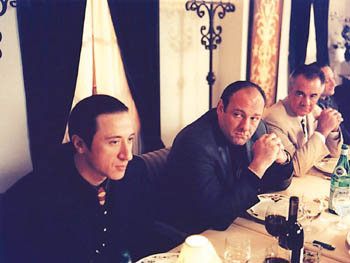![[Metroactive Arts]](/arts/gifs/art468.gif)
[ Arts Index | Silicon Valley | Metroactive Home | Archives ]
|
Buy one of the following 'Sopranos' DVD box sets from amazon.com: 'The Sopranos: The Complete First Season' (1999) 'The Sopranos: The Complete Second Season' (2000) 'The Sopranos: The Complete Third Season' (2001) 'The Sopranos: The Complete Fourth Season' (2002) |

Grace Under Pressure: Furio (Federico Castelluccio), Tony (James Gandolfini) and Paulie (Tony Sirico) take a break from the pressures of mob life. Tony Award James Gandolfini's complex comic mob boss makes 'The Sopranos' on DVD the best Mafia tale since 'The Godfather' HERE'S A LIST of the ways you can make a villain lovable. First is Hitchcock's method: Make him good at his job while others screw up. We'll sympathize, because everyone feels surrounded by incompetents where they work. Second is to make him misguided or estranged. Make him watch as his solid way of life, with its loyalties and dignities, is worn away. Let him seem to feel that he's losing the ground beneath his feet. A third trick is to make him a movie fan. If our villain has a sweet tooth for movies, a movie-loving audience will cut him some slack. Given a combination of these qualities, any villain will be transformed into an anti-hero. Tony Soprano (James Gandolfini), the most interesting person on television, is the exact opposite of the cute, affable personality that usually succeeds on the small screen. He's a loan shark, a racketeer, a frequent adulterer and murderer. In The Complete 4th Season of The Sopranos (now out on DVD through HBO Video for people who haven't been paying for HBO or want to watch it over again), Tony reaps some of the trouble he's sowed over the previous three seasons. Tony's wife, Carmela (Edie Falco), finally runs out of patience with his cheating. All of us know stories of marriages like Tony and Carmela's, marriages that went on for years--with apparent kindness on both sides--despite the fact that the husband was obviously sleeping around. If The Sopranos doesn't seem like a breakthrough, try recalling anything like Tony and Carmela's marriage in the last 10 years of the movies. The one fairly honest person on the show--and thus the one most sorely oppressed--is Dr. Melfi (Lorraine Bracco), Tony's psychiatrist. She's a stand-in for anyone who looks at the gorgeous, overstuffed life of all the Tony Sopranos out there, feeling their own faith in justice disintegrating. A long-running TV series has the advantage over movies in one especial respect: the passage of real-life time serves as a frame for the story. The characters age, and we age with them. Even so, after a few years, we never quite know what to expect with Tony Soprano. No other TV character can make you gasp when he acts suddenly. Ironically, the worst trouble Tony Soprano gets into during this fourth season are mistakes made through gentleness, rather than greed. His first big mistake is in sleeping with someone out of tenderness, rather than dumb lust. His second is losing his temper over the mistreatment of an animal. Besides these two serious mistakes, Soprano is plagued with continuing troubles--his increasingly out-of-control associate Ralph (Joe Pantoliano), a grating thug who's like a failed insult comedian. Moreover, Tony has to deal with the heroin problem of his designated successor, Christopher (Michael Imperioli, a co-writer on the show). On the whole, however, business isn't especially bad. In one episode, Tony asks his gloriously pompadoured assistant Silvio (Steve Van Zandt) which two enterprises traditionally survive a recession. Silvio knows the answer by heart: "Our thing, and certain aspects of show business." The show's appeal is easy to figure. It tells a hot, lurid story, with plenty of sex and violence. The location photography in north New Jersey, from the nastier slums to the leafy suburb where Tony lives, makes the show look different from anything on the air. Underneath, The Sopranos represents the first serious inquiry into the themes of The Godfather since Coppola's movies. The show asks where the limits are, in a land of liberty, and it speculates on whether devotion to a family is enough to redeem us. The difference between the somber Coppola dramas and this newer epic is the comic element. If The Godfather was like cinematic Hugo--outraged, morally indignant--The Sopranos is more like TV Balzac--amused and disgusted. The Corleones fought their way out of a ghetto, their hands forced by circumstance. Tony Soprano's struggle is mostly about holding on to his swimming pool. The Sopranos is almost always a comedy, and maybe that's because it's the direction Gandolfini draws it. His Tony is a sweet-faced bastard, lethal and lost: "What the fuck am I," he asks Dr. Melfi, "a toxic person or something?" The Mafia don is, really, an overgrown boy, with a crew full of his similarly old-boy pals, whose bodies are all breaking down after decades of parasitic living. The Sopranos is stuffed with top-drawer acting, but it's actually Gandolfini who has kept it in one piece. Ebullient and deadly, he gorges himself on the rottenness of the '90s. Gandolfini's strangely childlike side keeps this series fluid. He makes Tony Soprano hard to figure and easy to forgive.
Send a letter to the editor about this story to letters@metronews.com. [ Silicon Valley | Metroactive Home | Archives ]
|
From the November 20-26, 2003 issue of Metro, Silicon Valley's Weekly Newspaper.
Copyright © Metro Publishing Inc. Metroactive is affiliated with the Boulevards Network.
For more information about the San Jose/Silicon Valley area, visit sanjose.com.